[English] 日本語
 Yorodumi
Yorodumi- PDB-6i06: Crystal structure of psychrophilic phosphoglycerate kinase from P... -
+ Open data
Open data
- Basic information
Basic information
| Entry | Database: PDB / ID: 6i06 | ||||||
|---|---|---|---|---|---|---|---|
| Title | Crystal structure of psychrophilic phosphoglycerate kinase from Pseudomonas TACII18 | ||||||
 Components Components | Phosphoglycerate kinase | ||||||
 Keywords Keywords | TRANSFERASE / hinge binding / kinase / glycolysis | ||||||
| Function / homology |  Function and homology information Function and homology informationphosphoglycerate kinase / phosphoglycerate kinase activity / glycolytic process / gluconeogenesis / ADP binding / ATP binding / cytosol Similarity search - Function | ||||||
| Biological species |  Pseudomonas (RNA similarity group I) Pseudomonas (RNA similarity group I) | ||||||
| Method |  X-RAY DIFFRACTION / X-RAY DIFFRACTION /  SYNCHROTRON / SYNCHROTRON /  FOURIER SYNTHESIS / Resolution: 2 Å FOURIER SYNTHESIS / Resolution: 2 Å | ||||||
 Authors Authors | Mandelman, D. / Haser, R. / Aghajari, N. | ||||||
| Funding support |  France, 1items France, 1items
| ||||||
 Citation Citation |  Journal: Extremophiles / Year: 2019 Journal: Extremophiles / Year: 2019Title: Structural determinants increasing flexibility confer cold adaptation in psychrophilic phosphoglycerate kinase. Authors: Mandelman, D. / Ballut, L. / Wolff, D.A. / Feller, G. / Gerday, C. / Haser, R. / Aghajari, N. #1: Journal: Acta Crystallogr. D Biol. Crystallogr. / Year: 2001 Title: Crystallization and preliminary X-ray analysis of a bacterial psychrophilic enzyme, phosphoglycerate kinase. Authors: Mandelman, D. / Bentahir, M. / Feller, G. / Gerday, C. / Haser, R. | ||||||
| History |
|
- Structure visualization
Structure visualization
| Structure viewer | Molecule:  Molmil Molmil Jmol/JSmol Jmol/JSmol |
|---|
- Downloads & links
Downloads & links
- Download
Download
| PDBx/mmCIF format |  6i06.cif.gz 6i06.cif.gz | 160.4 KB | Display |  PDBx/mmCIF format PDBx/mmCIF format |
|---|---|---|---|---|
| PDB format |  pdb6i06.ent.gz pdb6i06.ent.gz | 125.7 KB | Display |  PDB format PDB format |
| PDBx/mmJSON format |  6i06.json.gz 6i06.json.gz | Tree view |  PDBx/mmJSON format PDBx/mmJSON format | |
| Others |  Other downloads Other downloads |
-Validation report
| Summary document |  6i06_validation.pdf.gz 6i06_validation.pdf.gz | 414.9 KB | Display |  wwPDB validaton report wwPDB validaton report |
|---|---|---|---|---|
| Full document |  6i06_full_validation.pdf.gz 6i06_full_validation.pdf.gz | 416.2 KB | Display | |
| Data in XML |  6i06_validation.xml.gz 6i06_validation.xml.gz | 16.8 KB | Display | |
| Data in CIF |  6i06_validation.cif.gz 6i06_validation.cif.gz | 24.4 KB | Display | |
| Arichive directory |  https://data.pdbj.org/pub/pdb/validation_reports/i0/6i06 https://data.pdbj.org/pub/pdb/validation_reports/i0/6i06 ftp://data.pdbj.org/pub/pdb/validation_reports/i0/6i06 ftp://data.pdbj.org/pub/pdb/validation_reports/i0/6i06 | HTTPS FTP |
-Related structure data
| Related structure data |  6hxeSC S: Starting model for refinement C: citing same article ( |
|---|---|
| Similar structure data |
- Links
Links
- Assembly
Assembly
| Deposited unit | 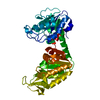
| ||||||||
|---|---|---|---|---|---|---|---|---|---|
| 1 |
| ||||||||
| Unit cell |
|
- Components
Components
| #1: Protein | Mass: 40302.250 Da / Num. of mol.: 1 Source method: isolated from a genetically manipulated source Details: There is a mismatch between the sequence deposited in uniprot (ID: Q9RBS3) and the structure at position 150. This should clearly be a Ser as judged from the electron density and not a Pro ...Details: There is a mismatch between the sequence deposited in uniprot (ID: Q9RBS3) and the structure at position 150. This should clearly be a Ser as judged from the electron density and not a Pro as listed in the sequence. Idem for residue 219 which is not a Ser but an Asp, and residue 358 which is not a Tyr but a Gln. Following residues have been refined as alanines due to missing electron density for the side-chains: Q12, K102, K116 and the K248 has been refined as a Ser and Ser266 as a Gly due to missing electron density Source: (gene. exp.)  Pseudomonas (RNA similarity group I) / Gene: pgk / Production host: Pseudomonas (RNA similarity group I) / Gene: pgk / Production host:  |
|---|---|
| #2: Water | ChemComp-HOH / |
-Experimental details
-Experiment
| Experiment | Method:  X-RAY DIFFRACTION / Number of used crystals: 1 X-RAY DIFFRACTION / Number of used crystals: 1 |
|---|
- Sample preparation
Sample preparation
| Crystal | Density Matthews: 2.18 Å3/Da / Density % sol: 43.49 % |
|---|---|
| Crystal grow | Temperature: 290 K / Method: vapor diffusion, hanging drop / pH: 7.5 / Details: 20% PEG 10000 and 0.1 M HEPES at pH 7.5 |
-Data collection
| Diffraction | Mean temperature: 100 K / Serial crystal experiment: N |
|---|---|
| Diffraction source | Source:  SYNCHROTRON / Site: SYNCHROTRON / Site:  ESRF ESRF  / Beamline: BM30A / Wavelength: 0.90005 Å / Beamline: BM30A / Wavelength: 0.90005 Å |
| Detector | Type: MARRESEARCH / Detector: IMAGE PLATE / Date: Mar 31, 2000 |
| Radiation | Protocol: SINGLE WAVELENGTH / Monochromatic (M) / Laue (L): M / Scattering type: x-ray |
| Radiation wavelength | Wavelength: 0.90005 Å / Relative weight: 1 |
| Reflection | Resolution: 2→29.55 Å / Num. obs: 23306 / % possible obs: 99.9 % / Redundancy: 2.8 % / Rmerge(I) obs: 0.095 / Net I/σ(I): 12 |
| Reflection shell | Resolution: 2→2.09 Å |
- Processing
Processing
| Software |
| |||||||||||||||||||||||||||||||||||||||||||||||||||||||||||||||
|---|---|---|---|---|---|---|---|---|---|---|---|---|---|---|---|---|---|---|---|---|---|---|---|---|---|---|---|---|---|---|---|---|---|---|---|---|---|---|---|---|---|---|---|---|---|---|---|---|---|---|---|---|---|---|---|---|---|---|---|---|---|---|---|---|
| Refinement | Method to determine structure:  FOURIER SYNTHESIS FOURIER SYNTHESISStarting model: 6HXE Resolution: 2→29.55 Å / SU ML: 0.25 / Cross valid method: FREE R-VALUE / σ(F): 2.03 / Phase error: 23.2
| |||||||||||||||||||||||||||||||||||||||||||||||||||||||||||||||
| Solvent computation | Shrinkage radii: 0.9 Å / VDW probe radii: 1.11 Å | |||||||||||||||||||||||||||||||||||||||||||||||||||||||||||||||
| Refinement step | Cycle: LAST / Resolution: 2→29.55 Å
| |||||||||||||||||||||||||||||||||||||||||||||||||||||||||||||||
| Refine LS restraints |
| |||||||||||||||||||||||||||||||||||||||||||||||||||||||||||||||
| LS refinement shell |
| |||||||||||||||||||||||||||||||||||||||||||||||||||||||||||||||
| Refinement TLS params. | Method: refined / Origin x: 55.0185 Å / Origin y: 6.3529 Å / Origin z: 0.4371 Å
| |||||||||||||||||||||||||||||||||||||||||||||||||||||||||||||||
| Refinement TLS group | Selection details: all |
 Movie
Movie Controller
Controller


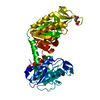
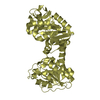
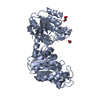
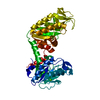
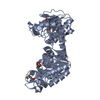
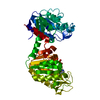
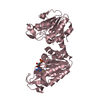
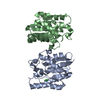
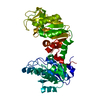
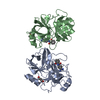
 PDBj
PDBj

